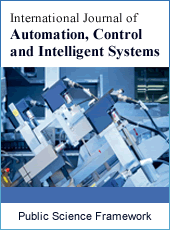International Journal of Automation, Control and Intelligent Systems
Articles Information
International Journal of Automation, Control and Intelligent Systems, Vol.4, No.2, Jun. 2018, Pub. Date: Aug. 10, 2018
Intelligent System for Temperature Control of Li-Pol Battery
Pages: 24-28 Views: 2156 Downloads: 629
[01]
Anastasia Shcherban, Instrument-making Department, National Technical University of Ukraine “Igor Sikorsky Kyiv Polytechnic Institute”, Kyiv, Ukraine.
[02]
Vitalii Larin, Department of Aviation Computer Integrated Systems, National Aviation University of Ukraine, Kyiv, Ukraine.
[03]
Volodymyr Maslov, Department of Physics and Technological Bases of Sensory Materials, V. Lashkaryov Institute of Semiconductor Physics NAS of Ukraine, Kyiv, Ukraine.
[04]
Nataliya Kachur, Department of Physics and Technological Bases of Sensory Materials, V. Lashkaryov Institute of Semiconductor Physics NAS of Ukraine, Kyiv, Ukraine.
[05]
Tatiana Turu, Instrument-making Department, National Technical University of Ukraine “Igor Sikorsky Kyiv Polytechnic Institute”, Kyiv, Ukraine.
The article presents the most used types of rechargeable stand-alone power supplies, trends in the control of the state of the most common of them - Lithium-Polymer Rechargeable Batteries (LPRBs) during their work, especially when using the latter for powering unmanned aerial vehicles (UAV). The necessity of such control for the qualitative result is showed. In this work, for the first time studied is the possibility of two-parameter diagnostic and controlling the lithium-polymer accumulators used in unmanned aerial vehicles. The aim of study was developing of a new method for non-destructive testing and diagnosing the Li-Pol accumulators that took to account fact that electrochemical processes are accompanied by heat phenomena. We were using thermal imaging method for study heating and cooling of battery in process of its work for establishing connection between temperature and degree of discharging of battery. Being based on experimental investigations, the authors found the one-valued dependence between the chosen LPAB parameters (output voltage and internal temperature) and residual time for battery operation. With account of this relation, to diagnose the state of the battery during the drone flight one can perform the first diagnostic test of new LPAB before the flight, and the obtained individual characteristics that will be recorded to the drone memory and further used to come to the necessary decisions of ceasing or prolonging the drone operation. Investigations on the temperature phenomena of Li-Pol batteries are a new scientific and practical direction, which may allow not only to create control systems, but also to improve the batteries themselves.
Thermal Imager, Non-Destructive Control, Lithium-Polymeric Rechargeable Battery, Unmanned Aerial Vehicle
[01]
Kimchi, G., Buchmueller, D., Green, S. A., Beckman, B. C., Isaacs, Sc., Navot, A., Hensel, F., Bar-Zeev, A., Rault, S. S., (2013). Unmanned Aerial Vehicle Delivery System. US Patent 20150120094.
[02]
Brar, S., Rabbat, R., Raithatha, V., Runcie, G., Yu, A., (2015). Drones for Deliveries. Pantas and Ting. Sutardja Center for Enterpreneurship&Technology. Berkeley Engineering. 21 p.
[03]
Yefimov, O. N., Belov, D. G., Belov, G. P. et al, (1995). New materials for lithium accumulators. Mashinostroitel'. No 3. pp. 24 - 28 (in Russian).
[04]
Skundin, A. M., Yefimov, O. N., Yarmolenko O. V., (2002). State-of-the-art as well as prospect for development and investigations of lithium accumulators. Uspekhi khimii. vol. 71, No 4, pp. 378 - 398 (in Russian).
[05]
Zou, C., Manzie, C., Nesic, D., (2016) A framework for simplification of pde-based lithium-ion battery models. IEEE Trans. Control Syst. Technol. vol. 24, 1594–1609.
[06]
Kim, T.; Wang, Y.; Fang, H.; Sahinoglu, Z.; Wada, T.; Hara, S.; Qiao, W., (2015) Model-based condition monitoring for lithium-ion batteries. J. Power Sources, vol. 295, 16–27.
[07]
Iraola, U., Aizpuru, I., Gorrotxategi, L., Segade, J. M. C., Larrazabal, A. E., Gil, I., (2015) Influence of voltage balancing on the temperature distribution of a Li-ion battery module. IEEE Trans. Energy Convers., vol. 30, 507–514.
[08]
Hannan, M. A., Lipu, M. S. H., Hussain, A., Mohamed, A., (2017) A review of lithium-ion battery state of charge estimation and management system in electric vehicle applications: Challenges and recommendations. Renew. Sustain. Energy Rev. vol. 78, 834–854.
[09]
Gao, Z., Chin, Ch. S., Chiew, J. H. K., Jia, J., Zhang, C. (2017) Design and Implementation of a Smart Lithium-Ion Battery System with Real-Time Fault Diagnosis Capability for Electric Vehicles. Energies. vol. 10, 1503.
[10]
Shcherban, A. P., Larin, V. Yu., (2015) Principles of operation and peculiarities of using the lithium-polymer accumulators. International scientific journal “Technological audit and reserves of production”. No 3, pp. 83 - 88 (in Ukrainian).
[11]
Svens, P., (2014). Methods for Testing and Analyzing Lithium-Ion Battery Cells intended for Heavy-Duty Hybrid Electric Vehicles. Doctoral Thesis, KTH Royal Institute of Technology, Applied Electrochemistry Department of Chemical Engineering and Technology, SE -100 44 Stockholm, Sweden, 87 p.
[12]
Chen, J.-J., Yang, F.-C., Lai, C.-C., Hwang, Y.-S., Lee, R.-G. (2009). A high efficiency multimode Li-ion battery charger with variable current source and controlling previous-stage supply voltage. IEEE Trans. Ind. Electron. vol. 56, N° 7. pp. 2469-2478.(6).
[13]
Traub, L. W., (2016). Calculation of Constant Power Lithium Battery Discharge Curves. Batteries, vol. 2, N° 17, pp. 1-7.
[14]
Lin, C.-H., Hsieh, C.-Y., Chen, K.-H., (2010) A Li-ion battery charger with smooth control circuit and built-in resistance compensator for achieving stable and fast charging. IEEE Trans. Circuits Syst. I Reg. Papers. vol. 57, N° 2, pp. 506-517.(7).
[15]
Venger, Ie. F., Mitin, V. F., Maslov, V. P., Ushenin, Yu. V., Dvornichenko, M. M., Kachur, N. V., Turu, T. A. (2016) Digital contact thermograph. Patent of Ukraine on useful model No 105665 from 25.03.2016, Bulletin No 6/2016.

ISSN Print: 2381-7526
ISSN Online: 2381-7534
Current Issue:
Vol. 4, Issue 4, December Submit a Manuscript Join Editorial Board Join Reviewer Team
ISSN Online: 2381-7534
Current Issue:
Vol. 4, Issue 4, December Submit a Manuscript Join Editorial Board Join Reviewer Team
| About This Journal |
| All Issues |
| Open Access |
| Indexing |
| Payment Information |
| Author Guidelines |
| Review Process |
| Publication Ethics |
| Editorial Board |
| Peer Reviewers |


